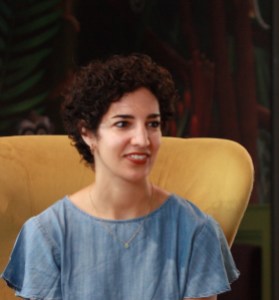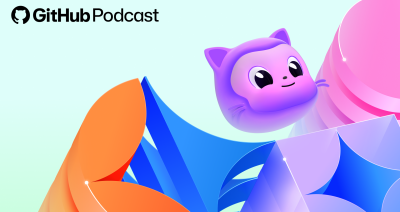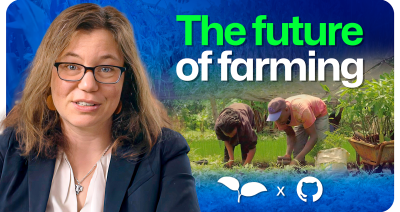If you want to learn more or support these causes, visit Audiopedia Foundation’s website and repository and Chayn’s website and repository. You can also contribute to Chayn’s frontend, backend, and soulmedicine work.
Empowering women through open source
A discussion about how tech is aiding organizations fighting for gender equality, what it means to be a woman in tech and the world today, and advice on how we all move forward.

It’s not often we step outside of our careers and busy everyday lives and pause to say, “Hey, what is this all about? Am I fulfilled? Am I finding meaning in what I’m doing day to day?”
As the Head of Commercial Legal at GitHub, I have quite a unique role. Most of my career was spent in a law firm until I transitioned into tech. I came from a male-dominated workplace and saw tech as a new environment (though still male-dominated) where ideas flourished and folks were allowed to be themselves in a safe space.
But this month—March is Gender Equality Month and celebrates Women’s Day—gave a reason to pause and reflect on my own journey, as well as ask what people and organizations are doing every day to empower women. So, I sat down with Felicitas Heyne, co-founder of Audiopedia Foundation, as well as Nadine Krish Spencer, Head of Product and Experience at Chayn. We discussed how tech is aiding organizations fighting for gender equality, what it means to be a woman in tech and the world today, and what advice and learnings they’d like to share with others. I hope you find as much inspiration from their mission, work, and stories as I did.
Jiyon Yun
Head of Commercial Legal // GitHub
Getting to know Audiopedia Foundation
Jiyon (GitHub): The work Audiopedia Foundation is doing is truly remarkable, and I would love to hear in your own words why these efforts are so essential and how you came to help found this organization.

Felicitas (Audiopedia): Audiopedia Foundation works to empower women in the global south through access to information in an audio format. We work with NGOs around the world to bring different forms of tech—from solar-powered audio players to WhatsApp to loudspeakers—to local communities based on their unique needs.
I had never dreamt of leading an organization doing social impact work all over the globe. But I have a hard time realizing there is an injustice and not doing anything about it.
I’ve always been passionate about empowering women and when we started to dive into the topic, we realized that 500 million women in the world are illiterate—and these are just the official numbers. There are also more than 7,000 languages in the world, half of which don’t even have a written language. We tried to come up with an idea to bring information to these women—including topics like health, economics, human rights—which sparked the idea of Audiopedia nine years ago.
Getting to know Chayn
Jiyon (GitHub): I think we could all take away some learnings from Chayn—from your values to the way you operate. Could you tell me about Chayn’s mission?

Nadine (Chayn): Chayn is a tech-forward nonprofit that aims to support survivors of sexual abuse, assault, and domestic violence with healing. We use technology to further accelerate that mission.
Jiyon: What really stood out for me about Chayn is how survivors are supporting other survivors. Can you speak a little bit more about that? How are women empowering other women to heal, find peace, and move forward?
Nadine: It’s definitely a powerful part of our organization. We are all women in the organization at the moment and that’s different, especially if you come from the tech world.
It was something that really drew me to Chayn and I thought, “Wow, I really want to see whether this survivor focus—we call it a trauma-informed way of working—is actually possible.” And to be totally transparent, we’re still figuring out the answer to that because we do have a lot of survivors on the team. It’s not something that people have to disclose, but it’s a constant awareness for us. And even if people aren’t survivors, quite often people close to them have experienced abuse. That adds an extra layer of understanding to the people we’re trying to reach and helps further our mission.
The role of tech in social impact work
Jiyon: What is the role of tech and open source in helping social impact organizations tackle global issues?
Felicitas: Tech is really a big opportunity to make a change. We’ve been doing development work for decades now and still, every third woman can’t read or write. These numbers haven’t changed despite all of the work from NGOs and that’s because the scalability and impact aren’t sufficient. But we can leapfrog this problem now with tech. That’s why tech is such a big opportunity. We can solve problems that we haven’t been able to solve for decades. And we can solve them quickly, so we don’t have to take another 300 years to reach gender equality.
Nadine: As somebody coming from the tech world, there was an assumption that moving into the charity or nonprofit sector might mean that it’s less progressive or less advanced in tech. But last year we were part of the DPG Open Source Community Manager Program and worked with a community manager who we’ve now gone on to employ. It has been instrumental having somebody who really got it from the tech side; we had tried to set up our own tech volunteer program before, but we saw it as quite a heavy lift to manage a tech community. And I think what she has really helped us to see is that there are people out there who just want to come in and help, without having met you or even getting credit. They do it because they’ve got an itch they want to scratch or they see this as a way to contribute to social good, and that is really unique. I don’t know if another industry operates like that where strangers come in and essentially perform random acts of kindness.
Sources of inspiration
Jiyon: As a woman leader, what inspires you? Who inspires you?
Felicitas: Any woman who’s willing and able to overcome obstacles. Becoming a victim is easy for a woman, but it’s very inspiring to see how women overcome and even grow from these challenges. Women are the largest untapped potential in the world in my point of view. We’ve had 2,000 years of patriarchy behind us, and I’d really love to see what would happen with 2,000 years of matriarchy ahead of us.
When we were in Morocco, we went to a women’s shelter and I listened to many women’s stories. As I listened to them, I had no idea how they could overcome and survive what they went through, but they were there, many with their children, moving forward. It was so impressive and I realized that anything I could do to make it easier for them and women like them is an obligation. I didn’t earn my privilege; it was mere luck. So, I have a strong need to help those who aren’t as privileged. It’s a question of justice in my eyes; inequality drives me crazy.
Advice for women in tech
Jiyon: If you looked back 5 years ago, 10 years ago, or when you were starting your career, what advice would you give women who aren’t in tech right now but who want to follow that path?
Nadine: Tech holds the power to try and do things differently. And we’re at a point where it would be easy for women to retreat. In the same way that sometimes we retreat from other male-dominated spaces; the wider world of tech could become one of those places.
When I was in the commercial world, I tried my best as one of two women on a floor with maybe 100 men. I joined the company when it was only 35 people as a product manager and saw them scale to around 450 people by the time I left. Because I was able to climb so quickly as the company scaled, I struggled a lot with imposter syndrome.
People would tell me to “break down the imposter syndrome,” especially because I was a woman. But the idea of just “breaking it down” is really tough, and it made me think even more that I wasn’t cut out to do this, which was really hard to shake. But as the company grew and I was surrounded by more women, I actually realized the better advice is: find your allies. Having allies—of any gender—helps you start to shake the imposter syndrome naturally and you become a lot more confident when you’re not in a place of isolation.
Where we go from here
Jiyon: What can women and other leaders do to contribute to and inspire change?
Felicitas: The key is empathy. If you start to look to the global south, you very quickly realize that most of the things we take for granted in our lives aren’t granted for billions of people, especially women. It’s important to question your position in the world, recognize your privileges, and use your empathy to drive action.
Nadine: It’s really important to get some “balcony time” where you step out and look over what’s going on in your life and all around you. It’s really difficult to juggle everything in your day-to-day life and to just stop and reflect. And the second part is then to act on those realizations and start doing things for other people. It’s taking the time to acknowledge the people in your life and to say, “I see you there and I see how you’re showing up for other people.” Recognition and support are things we’ve got to do for each other.
Speaking with both Felicitas and Nadine moved me in a way I wasn’t expecting. It was a good reminder to take that “balcony time” and step outside of my every day, reflect on what I can do to impact others, and take steps to do that. I hope you found some inspiration from their stories as well.
Written by
Related posts

From first commits to big ships: Tune into our new open source podcast
Introducing the brand new GitHub Podcast: A show dedicated to the topics, trends, stories, and culture in and around the open source developer community on GitHub.

Scaling for impact: How GitHub Copilot supercharges smallholder farmers
Empowering 10 million farm families by 2030 to generate $1 billion in new revenue. How GitHub helps One Acre Fund’s mission — driving real impact across Africa.

We need a European Sovereign Tech Fund
Open source software is critical infrastructure, but it’s underfunded. With a new feasibility study, GitHub’s developer policy team is building a coalition of policymakers and industry to close the maintenance funding gap.
We do newsletters, too
Discover tips, technical guides, and best practices in our biweekly newsletter just for devs.